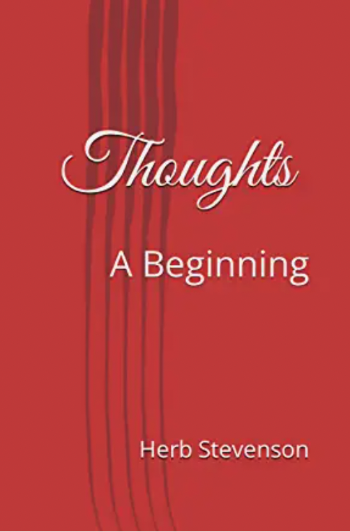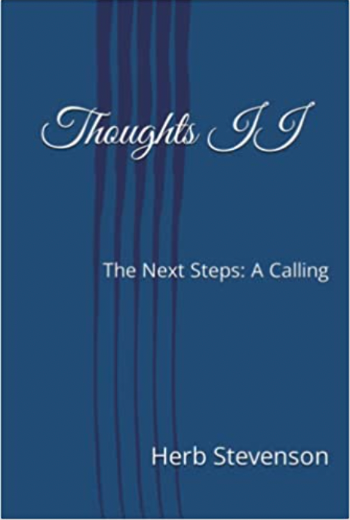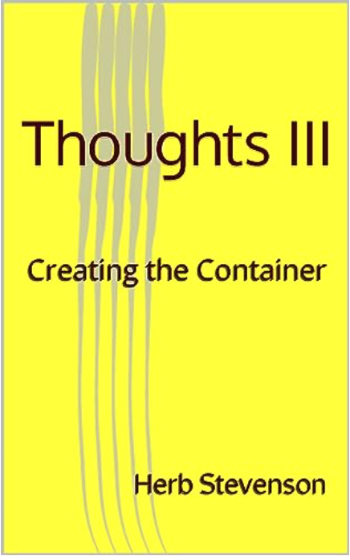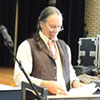

A book by Herb Stevenson, Volume 1. Learn more on Amazon.
Thoughts II:
The Next Step: A Calling

Volume 2 of 3. Learn more on Amazon.
Thoughts III:
Creating The Container

Volume 3 of 3. Learn more on Amazon.
To Lead
Read the article about training with Herb Stevenson in ALN Magazine.
See the article...
Finding and Acting on Common Ground with Future Search1
By Herb Stevenson
Future search is an interactive large group planning meeting that enables people to find common ground, create a shared vision and devise an implementation strategy, all in less than three days. It is used around the world to transform systems' capability for cooperative action.
One reason for its popularity is that future search has turned out to be a remarkably effective and flexible methodology. Future search sessions have been run for purposes as diverse as:
- Helping UNICEF/Indonesia develop an infrastructure for decentralizing education.
- Helping the Toronto, Ontario school system create a comprehensive strategic plan.
- Facilitating the integration of seven struggling Jewish synagogues in Philadelphia.
- Assisting joint initiatives by diverse population planning agencies in Ethiopia and Nigeria
- Training local facilitators who ran future searches that led to the demobilization of thousands of child soldiers in Sudan.
- Creating integrated health care in Nevada.
These methods have helped people take action on issues they cared about when they had previously been stopped by any of a number of barriers, like:
- Not enough of the people with information or passion or decision-making authority were involved;
- Those involved didn't know how to begin the change process;
- People didn't understand the issues and consequences well enough to want change;
Future search helps overcome those barriers because it brings together people with information, authority, resources and passion, helps them find common ground and purpose, and enables them to plan action.
The Success Principles
Four key principles are the foundation of the success of future search. These principles, validated by decades of research and experience, provide practitioners with a shared context for working together. They are:
Get the 'whole system' in the room. Ideally, we want a cross section of stakeholders who, together, have the resources, authority, skill, and knowledge to act, if they choose, without asking permission from anyone not present. This criterion alone guarantees reality about whether a desirable action plan will be taken.
Explore the whole before seeking to fix any part. In future search two thirds of the conference is spent in joint exploration, of the past, present trends, future aspirations, where people learn from each other and create a portrait of the whole that no one person can put together alone. No action is attempted until everyone has been involved in this whole systems assessment (a task once reserved for consultants alone).
Focus on the future and common ground rather than problems and conflicts. Nothing is swept under the rug. However, we treat conflicts and problems as information about what is, not as action items. The action agenda is the discovery of common ground and what people are willing to do right now. No time is spent seeking to reconcile deeply-held opposing convictions, only to validate them.
Self-manage small groups and action planning. People manage all small group tasks without expert facilitators. They take responsibility for what they are ready, willing and able to do. By 'voting with their feet' (e.g. signing up to act, rather than prioritizing as a group what they think should be done) they create de facto priorities likely to be carried forward.
The Meeting Design
The meeting design of a future search incorporates the four key principles in such a way that strangers with aligned concerns can develop trust and commitment in a short time.
The meeting can involve 60-80 people working in one room at one time, all contributing to the same agenda. Meetings with very small groups may have less of the energy and information required for action. Groups that are too large may prevent people from feeling heard and part of the action. To accommodate more people, additional future searches are run in parallel or in sequence.
In the meeting, people explore together their shared past, present, desired future, and common ground. Participants supply all the content. That's important because participants realize that they do have everything they need to make decisions, set priorities, and take action. Action planning is put off until every person has a picture of the whole that none had at the start
Leadership is shared. Anyone who wishes can take leadership roles in small groups, public reports and whole group dialogues. It's wonderful to see people who had not been recognized as having leadership ability -- students, homemakers, entry-level employees -- step up to take on key roles...and shine.
The key to success is matching purpose and participants so that those with authority, resources, and need are in dialogue the whole time. This enables people to be as realistic as humans can be about their aims and potential. To paraphrase Yogi Bera, if the people in the room decide not to act, nobody can stop them. If they do act, get out of the way!
A Theory and Philosophy of Facilitating
A philosophy and theory of whole systems change undergirds the practice of future search facilitation. Facilitators help people stay whole and task focused. They do not attempt to make up for perceived group deficits, nor to teach skills people do not already have. Practitioners observe the following precepts in managing future searches:
- All people are experts on his/her own experience, thoughts and feelings.
- All ideas are relevant.
- Everyone is doing the best they can with what they have.
- People only do what they are ready, willing and able to do.
- People choose for themselves whether and how to join in.
- The facilitator's task is to provide a structure that enables people to cooperate and commit if they wish, not to diagnose behavior, or inquire into motives.
- Diverse groups come together more fully when they discover their own meanings and interpretations rather than have consultants summarize for them.
- Future search facilitation centers on giving instructions, observing time boundaries, and making space for anyone who wants to speak.
- Facilitators become active only if a group abandons its core task or a member is at risk of being scapegoated.
Future search practitioners confirm daily the conditions under which ordinary people, without prior training or elaborate tools, can find common ground and implement extraordinary projects.
The method, we have learned, enables large, diverse groups with common stakes to discover within a few days desired futures and to make action plans that often live for years. Moreover, this result has been repeated in such diverse cultures as the Inuit of the Arctic, the Aboriginal peoples of Australia, Native American communities, and in cities and towns across Africa, Europe, Asia and North America, and even the U.S. Army and large business firms.
Footnote
1Marvin Weisbord and Sandra Janoff together have more than 60 years of experience in group leadership. They are co-authors of Future Search: An Action Guide to Finding Common Ground, 2nd Edition (Berrett-Koehler, 2000).
We Appreciate Your Feedback
Please let us know if you found this article interesting or useful. We will not submit this information to any third parties.

